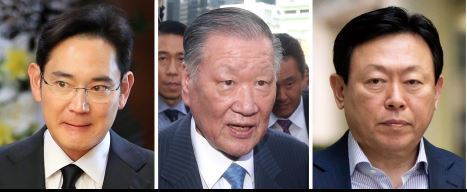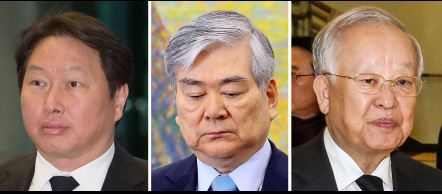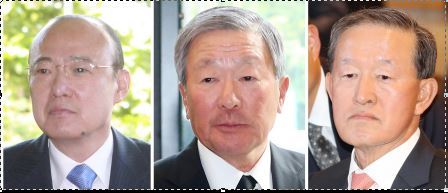In the biggest-ever parliamentary questioning of the nation’s industrial figures, nine chaebol chiefs are set to take the stand at the National Assembly Tuesday, to answer questions over their relationship with President Park Geun-hye and her longtime friend Choi Soon-sil.
It is the first time in South Korea’s modern history that the top chaebol leaders will be brought together in a televised parliamentary hearing to face questions over their allegedly cozy ties with politics and power, a topic that has mostly been considered taboo.
None of them are charged with irregularities, but they are expected to face questions to determine whether they were victims or beneficiaries of the Park administration’s alleged corruption.
But questions remain how the parliamentary grilling will play out. Some fear it may devolve into a forum for political grandstanding or become an opportunity for businesses to address public discontent on their relationship with the government.
The hearing is the largest ever also in significance.
Korean chaebol led South Korea’s fast economic growth in the 70s and 80s under the support of military governments led by Park’s father, President Park Chung-hee. Because of this, summoning chaebol owners to open parliamentary hearings has been considered risky, and chaebol often ignored calls to attend, citing business schedules.
 |
From left: Samsung Electronics Vice Chairman Lee Jae-yong, Hyundai Motor Group Chairman Chung Mong-koo and Lotte Group Chairman Shin Dong-bin (Yonhap) |
But there have been times when conglomerate owners have been questioned by lawmakers.
In 1988, the National Assembly summoned then-Hyundai Group Chairman Chung Ju-young over his role as the chairman of the Federation of Korean Industries, which was suspected of raising fund for the Ilhae Foundation launched by former President Chun Doo-hwan.
The nine chaebol facing the Assembly this week represent a large portion of the nation’s economy, and of its all-important exports.
Some say that having them at the witness stand will strike a serious blow to their global reputation and aggravate anti-business sentiment here.
Tycoons are expected to say that they gave the money with no favors in mind, but Chung Sun-sup, CEO of Chaebul.com, said evasive answers may create a bigger backlash.
“The vicious circle of businesses offering money to the president in exchange of favors should end here. But if they keep saying that the donation was made voluntarily (without strings attached), it will never end here,” he said.
The hearing on Tuesday, meanwhile, brought a full stop to the tycoons’ business operations over the weekend to prepare for questions from the 18 lawmakers -- half from the ruling party and half from the opposition parties.
 |
(From left) SK Group Chairman Chey Tae-won, Hanjin Group Chairman Cho Yang-ho and CJ Group co-Chairman Sohn Kyoung-shik (Yonhap) |
According industry sources, some companies have formed special teams consisting of journalists-turned-executives to go through the questions and answers with the chairmen. Some with aging tycoons will have medical teams and ambulances waiting outside the hearing room in case of an emergency.
Hyundai Motor Chairman Chung Mong-koo, 79, is the eldest of the nine, followed by Sohn Kyoung-sik, co-chairman of CJ Group, who is 78. The list also includes LG Group Chairman Koo Bon-moo, Hanwha Group Chairman Kim Seung-youn, Lotte Group Chairman Shin Dong-bin, Hanjin Group Chairman Cho Yang-ho and SK Group Chairman Chey Tae-won.
GS Group Chairman Huh Chang-soo has been summoned as the head of the FKI, a group of large companies linked to the Choi scandal.
Samsung Electronics Vice Chairman Lee Jae-yong, the youngest of the nine, is expected to be at the center of the hearing as he is to be asked about the motives behind the tech giant’s massive donations to the two private organizations controlled by Choi and her associates.
 |
(From left) Hanwha Group Chairman Kim Seung-youn, LG Group Chairman Koo Bon-moo and GS Group Chairman Huh Chang-soo (Yonhap) |
Among the nine, Samsung made the largest donation, 20.4 billion won ($17.3 million) to the Mir and K-Sports foundations. The total money Samsung allegedly offered to Choi and her family amounts to almost 30 billion won. The prosecution has been investigating whether the money was given in exchange of Samsung’s leadership transition to Lee Jae-yong, by allegedly pressuring the National Pension Service to approve a controversial merger between Samsung C&T and Cheil Industries despite opposition and financial losses last year.
SK and Lotte Group are the next on the line as they are to face questions over allegations that they had asked for favors to win back duty free licenses they lost last year. For CJ, SK and Hanwha, chairmen are likely to be asked whether they asked for the president’s special pardon for their wrongdoings.
Despite the political implication of having the chaebol owners at the witness stand, Park Ju-gun, CEO of CEOScore, a local corporate watchdog, said the grilling session won’t be a new beginning.
“What the (state) power and the chaebol have in common is that they are the organizations that have never been interrupted or checked,” he said, adding that the power of chaebol has only been tamed by the political power instead of the board of directors or shareholders.
“As long as chaebol’s ownership (of controlling companies through complex shareholding structures) remains as it is today, the cozy relationship will continue.”
By Cho Chung-un (christory@heraldcorp.com)










![[Today’s K-pop] Blackpink’s Jennie, Lisa invited to Coachella as solo acts](http://res.heraldm.com/phpwas/restmb_idxmake.php?idx=644&simg=/content/image/2024/11/21/20241121050099_0.jpg)